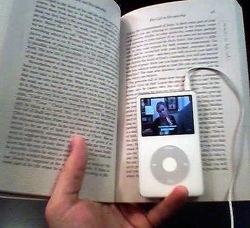UK Primary Grades Won’t Dump History For Twitter, After All
Apr 7th, 2009 | By Elisabeth Lewin | Category: Commentary, The New Media Update  A week or so ago, we wrote about reports that changes to curriculum in grade schools in the UK would forsake “studying things like the Second World War and the Victorians in favor of Twitter, Wikipedia and podcasts.”
A week or so ago, we wrote about reports that changes to curriculum in grade schools in the UK would forsake “studying things like the Second World War and the Victorians in favor of Twitter, Wikipedia and podcasts.”
A review of, and updates to, the country’s centrally-proscribed curriculum would have meant requiring student fluency in social and new media by the time students left primary school, at the expense of learning abut “the Victorian period or the Second World War.”
As we expected, the response to this prospect was swift, furious, and overwhelmingly negative.
So, it comes as little surprise to read today that UK Children’s Secretary Ed Balls maintains that history will stay intact as part of England’s primary school curriculum.
In remarks to a meeting of the Association of Teachers and Lecturers, Balls said that the curriculum redesign was not a matter of choosing only history or only information technology in the classroom. However, he said, “it’s also absurd that children are stuck in a dark age of technology when they learn history.”
The BBC article reports that “Children will be taught the broad chronology of major events in Britain and the wider world – from ancient civilisations through the Romans, the War of the Roses, the industrial revolution and the world wars to the modern day.”
It may come as a surprise, or seem inconsistent coming from a website that focuses on technology and new media, but the idea of focusing young children’s education on new media at the expense of history is about the most asinine thing we’ve read in ages (and we read about plenty of asinine initiatives and practices).
The Internet, blogging, podcasts, and new media are just tools that make for easier discovery of content, and for easier dissemenation of content. That content itself, whether history or the arts, mathematics or sciences, should remain a central focus of the primary school curriculum.
Those technology tools make the student and teachers’ jobs easier in many ways, but it is important to keep in mind how quickly and dramatically the tools change.
How many of our techie readers grew up learning programming on punch cards? In FORTRAN? Board-wiring? How many of us had clerical job skills that included WordStar, Lotus 1-2-3 and booting up dual-floppy-drive PC-XT’s or early Macs?
Those are all nice skills to have, but do little for us in our work today other than provide good fodder for nostalgic stories. Learning technology skills is helpful in that it gives us practice in thinking technologically. But to place much import on studying the particular applications of this brief moment in time is wasting time, and depriving young people of a broader educational foundation that would help them much more later in life.
I don’t think the authors of the new curriculum had in mind to “study” twitter forever from now on.
It isn’t about “studying” web 2.0 apps, it is about using them in the process of learning. That is the bottom line.
Against it are protesting a lot of teachers and parents, because they are reluctant to use the new technology.
And history (in fact, historiography) is changing too, along with all the other areas of knowledge.
Thoroughly disagree. ‘One must teach children TO read before you tell them WHAT to read.’
Recently, there was a video featured on this very site, that demonstrated the general technological ignorance of people in Time Square, by asking them what browser they used.
https://www.podcasting-news.com/2009/09/27/socialno…
The world HAS CHANGED, so this is not a question of techie vs non-techie. It is more like digital vs analogue: We have had thousands of years to master the art of learning from/with books; but do not have that luxury with technology. We MUST teach young people HOW AND WHY so they don't become enslaved by commercial stupor.
NB: I personally have learned fathoms more in my life since leaving school and having internet access.
Sorry about the lateness of the comment.
K
Thoroughly disagree. ‘One must teach children TO read before you tell them WHAT to read.’
Recently, there was a video featured on this very site, that demonstrated the general technological ignorance of people in Time Square, by asking them what browser they used.
https://www.podcasting-news.com/2009/09/27/socialno…
The world HAS CHANGED, so this is not a question of techie vs non-techie. It is more like digital vs analogue: We have had thousands of years to master the art of learning from/with books; but do not have that luxury with technology. We MUST teach young people HOW AND WHY so they don't become enslaved by commercial stupor.
NB: I personally have learned fathoms more in my life since leaving school and having internet access.
Sorry about the lateness of the comment.
K
Great advice, i need some time to think about this. What you wrote is great advice any way that you look at it.
Follow me on Twitter